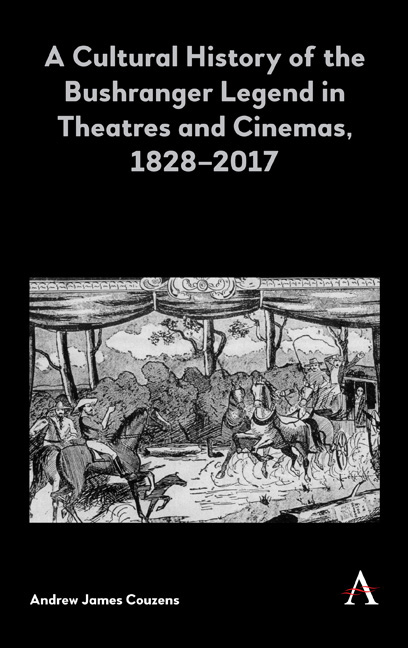Book contents
- Frontmatter
- Contents
- List of Figures
- Acknowledgements
- Introduction: Defining the Bushranger Legend
- Part 1 Establishing the Legend
- Part 2 Developing the Legend
- 5 The Bushranger Genre from Stage to Screen
- 6 The Bushranger Ban
- 7 British and American Interventions in the Bushranger Legend
- 8 Radical Nationalism and the Bushranger Legend
- Part 3 Fragmenting the Legend
- Conclusion
- Bibliography
- Index
6 - The Bushranger Ban
from Part 2 - Developing the Legend
Published online by Cambridge University Press: 14 February 2019
- Frontmatter
- Contents
- List of Figures
- Acknowledgements
- Introduction: Defining the Bushranger Legend
- Part 1 Establishing the Legend
- Part 2 Developing the Legend
- 5 The Bushranger Genre from Stage to Screen
- 6 The Bushranger Ban
- 7 British and American Interventions in the Bushranger Legend
- 8 Radical Nationalism and the Bushranger Legend
- Part 3 Fragmenting the Legend
- Conclusion
- Bibliography
- Index
Summary
The previous chapter focused on the bushranger films made before World War I as it is this period that Routt considers in his discussions of the bushranger genre. This cut- off point represents the end of the bushranger film as a movement and the start of a far more sporadic approach to the subject. The blame for this is often directed toward the NSW police ban on bushranger films, but though I explore the implications of that ban I argue that the move away from bushranger narratives resulted from the economic and institutional consolidations that defined the postwar industry. The police ban was only a small contributing factor in a shift that trade magazines, distributors and exhibitors spearheaded, demolishing the viability of the low- brow, populist bushranger pictures. These forces hindered the development of the bushranger genre, and those few silent bushranger films made following World War I are evidence of a significant and contrived shift away from the cinematic representation of bushrangers before the war with filmmakers and audiences forced to tolerate moral coding that undermined the earlier bushranger narratives.
The eventual decline was partly a result of the scattered and inconsistent censorship system in place in Australia. At the time of Federation, conventional wisdom considered cinema a novelty of limited longevity. Legislators therefore developed no specific regulations in relation to films, and the state governments retained censorial jurisdiction, applying the regulations they had for theatre to film. In NSW the 1908 Theatres and Public Halls Act divided responsibility for censorship between the police and the Chief Secretary's Department, and other states had comparable systems. Even when interest in a coherent federal censorship system grew in 1917, the lack of foresight in the earlier division of power between state and federal governments meant that the latter controlled film imports only, meaning local films were subject to the judgement of each state. Few states had a classification system and those that did struggled to enforce them, so censorship tended to be inexact and clumsy. The inconsistency between the state systems and the uncertainty this produced became one of the biggest problems the burgeoning bushranger genre faced.
- Type
- Chapter
- Information
- Publisher: Anthem PressPrint publication year: 2019



